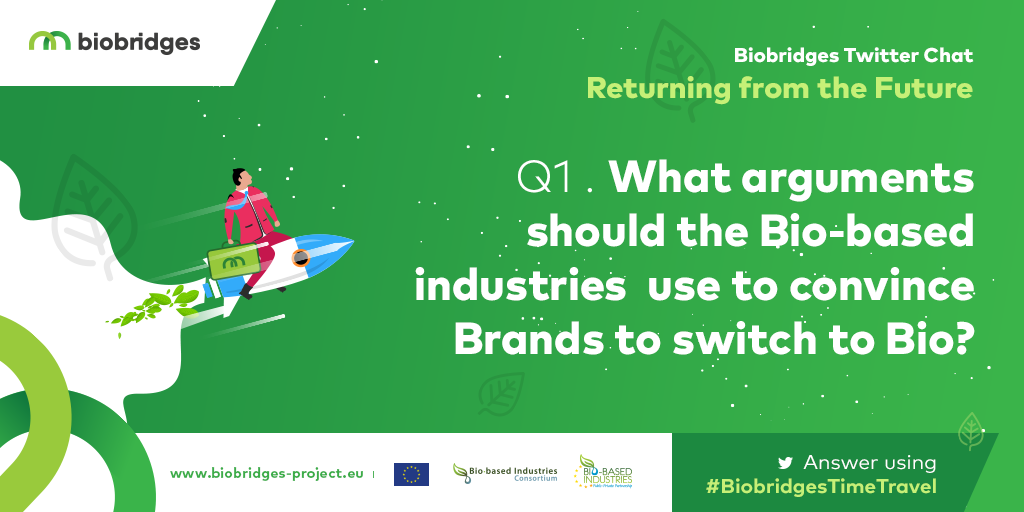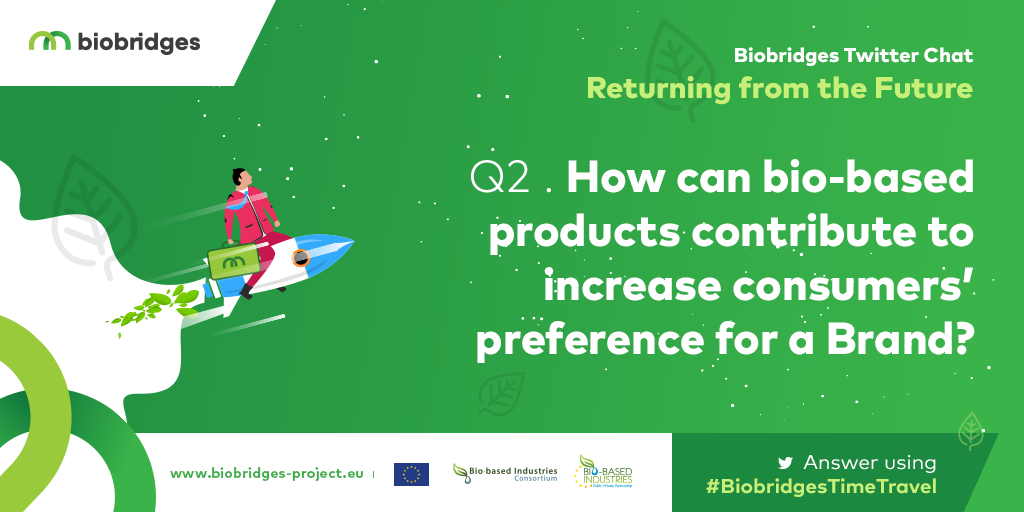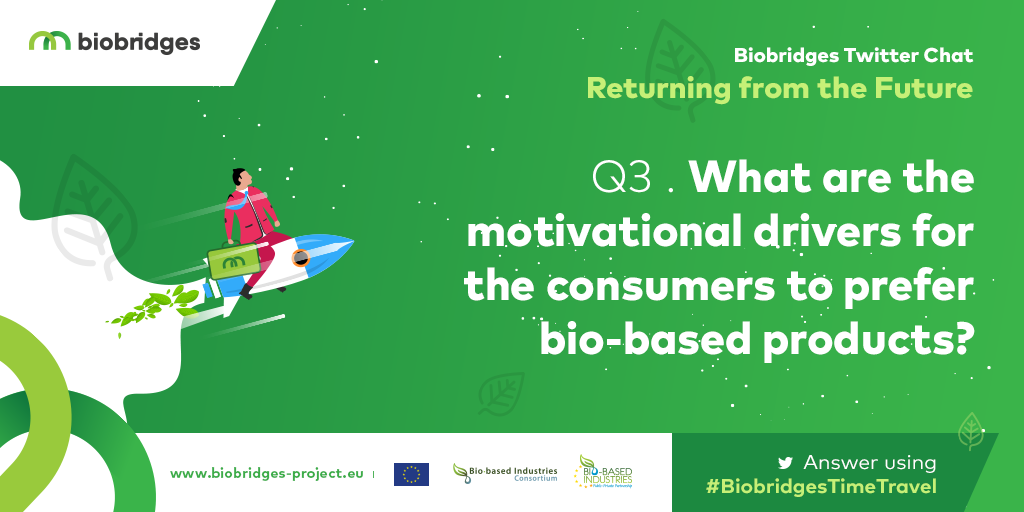Biobridges project launched on 23 of September, a gamified experiment to brainstorm about the future of Bioeconomy and Bio-based market, launching the #BiobridgesTimeTravel chat in twitter.
Back from the future! Biobridges twitter chat enabled the participants to travel in time from 2060 and tell us how Bioeconomy saved the planet from the environmental threats, providing recommendations to Industries, Brands, Policy Makers and Consumers of 2019.
The twitter chat was inspired by the document "vision for a circular bio-society in 2050" developed by Bio-based Industries Consortium (BIC) and the BBI JU’s advisory bodies
The following 3 questions have been used to trigger the discussion:
Q1: What arguments the Bio-based industries should use to convince Brands to switch to Bio?
Q2: How bio-based products can contribute to increase consumers’ preference for a Brand?
Q3: What are the motivational drivers for the consumers to prefer bio-based products?
You can still contribute to the discussion by using #BiobridgesTimeTravel.
How will be the bio-society in 2060, according to the #BiobridgesTimeTravel chat participants:
The global climate social movements driven by students around 2020, raised the interest and attention of the public opinion about environmental threats. Policies, strategies and massive investments promoted the so-called transition decade from 2020 to 2030. Brands and Industries played a central role in the transition, initially introducing dedicated circular bio-based products lines, and, in few years, moving the entire business models toward a more sustainable one. Switch-to-bio was a real competitive advantage for Brands and Industries in the ‘20s.
Pioneering European policies and investments facilitated the price alignment compared to fossil based and the massive preference of the consumers, supported by a transparent education and information on the bio-based products (through hi-tech devices and chips), boosted the transition.
New technologies ensured the feedstock quality, availability and sustainability, enabling the scale-up of demand, as well as the unlock of second generation biomass from waste, agri-food, forestry and sea.
Read next the chat exchanges:

BIOPEN: By switching to bio, you will be able to make your products even in 2060. Those who didn't switch to alternative feedstocks are not around anymore.
Lucy F R Montgomery: Fossil fuels are finite, and by 2060 people have finally understood that! Bio resources are renewable resources; it's the simplest argument for going #biobased!
BioBase4SME: Stakeholder outreach is really important, even for startups and small companies with niche products! Check out our brochure on this topic. https://www.nweurope.eu/media/3974/social-acceptance-guide-pdf-version_22032018.pdf
Particula group: Petroleum is a limited resource and fossil-based plastic & fuels are main responsible for pollution + climate change + global warming + diseases
ASEBIO: Lower production cost. Most biodegradable materials follow the three basic R’s of sustainability: Reduce, reuse and recycle
ASEBIO: Consumers are increasingly demanding sustainable products, these days are willing to pay high prices for premium products, organic products. This is due that they´re promoted as being inherently better in comparison to conventional synthetic products
Biobridges: Are the prices of bio-based products still so high in 2060? Have all the brands switched to bio-based?
Eubionet: Brands are already motivated by the increasing demand from the consumers. Bio based industries should understand and address the specific requirement from Brands in terms of functionalities and performance (and price) of BBPs
BIOVOICES: Some bio-based product have also better characteristics of performance than fossil-based. This is something that can convince Brands.
PEDAL: Our suggested answer would actually be the reverted question: "What is the estimated cost/loss if you do NOT switch to bio?"
BIOVOICES: Governments have to give incentives to the bio-based products industries so that the prices for the brand owners can be lower or at least the same as the fossil-base counterpart. This can give Brands the most important driver to switch to bio-base.
Mercedes Rois: Given the technological advances happening and the increasing demand for bio-based products, the production costs are much lower. Furthermore, the penalties for fossil-based products are too high, and countries are very strict on this.
DANDELION: It is a new trend and consumers are eager for bio products.
PEDAL: The #EU policy has a clear vision (https://biconsortium.eu/sites/biconsortium.eu/files/documents/Vision%20for%20a%20circular%20bio-society%202050.pdf). Now, if you are a brand wanting to make money also in the future, you should consider this.
PEDAL: Point out at bigger or similar #brands which already switched to "bio". And then ask "why you haven't switched to "bio" yet?"

Lucy F R Montgomery: Back in 2019, the school strikes for climate really helped raise awareness not just of renewable energy but also of renewable products. The demand for better products led to excellent ecolabelling schemes. People then chose the products with the labels!
BioBase4SME: Clear simple messages about a biobased product's eco-credentials, supported by independent LCA data. In 2019, consumers wanted to chose better products and trust brands more, but they didn't know what was really better.
BIOWAYS: A brand with sustainable options for their products sends an image of concern for the planet, and not only for turnover. This can be appreciated by customers.
ASEBIO: Thanks to innovative green technologies developed, the performance of renewable-based goods products are as good or better than traditional petroleum-based materials
Biobridges: Is bio-based applied in all fields?
Biobridges: What are the most used raw materials in 2060?
EuBioNet: In 2019/2020 sustainable brand were perceived positively. Big social movement increased the attention to environmental issues. The Brands that moved their production to circular bioeconomy gained a competitive advantage.
EuBioNet: In the transition decade (from 2020 to 2030) trust was a key. The consumers were suspicious about green claims and the sustainability issues had to be supported by facts. Brands started to diffuse knowledge through (green) foundations.
BIOVOICES: Brands have to write "stories" about the single BBP! What this product does for the environment, the health and societal benefits etc. Consumers want to be informed about the products they buy and a well structure description can push them to switch
BIOPEN: By establishing themselves as a trusted brand, fully committed to sustainability. Consumers then followed the brand and not second guessed the fine print/needed another story, but chose good quality with sustainability built in.
ASEBIO: Most of the available bio-based materials are non-toxic and allergy-free.
Mercedes Rois: People realized bio-based products were healthier for them and the planet, making people feeling better with themselves for contributing to take care of the planet, giving new life to rural areas through sustainable management of natural resources.
IBISBA BIOTECH: Healthy, safe and nutritious food, greener products, sustainable industrial processes, waste (and pollution) reduction.
DANDELION: Increases the feeling of trust in that brand
PEDAL: By communicating #transparently also about their down-sides. It's like with individuals: Nobody is perfect and that makes us perfect ;-)
PEDAL: Tell the #full #story of how your #BBP was made, starting from the #feedstock, through the #processing, all the way to the shelves of the shopping centers

BIOWAYS: In 2060 our oceans are clean, marine life is safe, the climate is not crazy hot nor crazy cold (most of the time), our air is clean, our children are not concern about the future or having one. In 2019 people need to act & with time results will appear
Lucy F R Montgomery: Inspirational people leading the way, along with governments and companies making it easy to make the right choices! This made people choose #biobased.
BioBase4SME: Initially, the main motivational drivers for consumers to prefer #biobased products was that consumers wanted to be good. Once they had clear messages and trusted brands, it became easier to do! With time, #biobased also became more price competitive.
ASEBIO: The environmental awareness of consumers practicing such activities is rather strong and they are more and more looking for products that are in line with their personal values for sustainable development.
DANDELION: Consumers are concerned with the environment. Special young people as we saw in the last weeks demonstration around the world. @GretaThunberg
Biobridges: Can you tell us in 2060 how consumers' habits have changed?
EuBioNet: In the "transition decade" the young generations drove the change. The main motivational driver was to save the planet from the environmental threads. This big movements reshaped in few years the public opinion, boosting the circular bioeconomy
Particula Group: Healthy future for our kids and sustainable way of life. As a consumer we all need to increase awareness and start behavior changes REDUCE + REUSE + RECYCLE + EDUCATE
EuBioNet: Health for themselves and their kids. Secure products. Enviromnental issues.
Mercedes Rois: Their inner peace on conscious decisions, their own health, their lower solalstalgia, the good feeling for being surrounded by wood, trees and nature in the biocities, the lower rate of natural disasters...
ASEBIO: Leave a better world for our children, so we have to find the way of reusing the wastes that we produce and Circular #Bioeconomy is trying to do that (Social Conscience driver).
IBISBA BIOTECH: Bioeconomy is a unique opportunity to develop more sustainable processes and address grand challenges, such as climate change and food security. It is also a chance to create new jobs and maintain leadership in many high added-value market sectors.
IBISBA BIOTECH: Switching to a circular bioeconomy will reduce waste and convert it into added-value products for a greener and healthier planet.
PEDAL: Seeing the videos showing the oceans full of plastic, realising that it already entered into our food chain.
PEDAL: 1) HEALTH 2) KIDS 3) PLANET